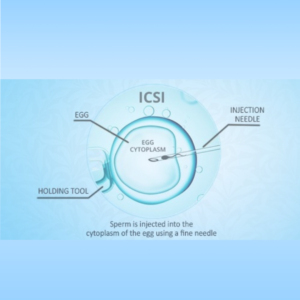In the realm of assisted reproductive technology (ART), Intracytoplasmic Sperm Injection (ICSI) has emerged as a groundbreaking technique, offering hope to couples facing challenges in conception. ICSI, a specialized form of in vitro fertilization (IVF), has revolutionized the treatment of male infertility and has become a beacon of optimism for those navigating the intricate journey towards parenthood. This blog delves into the intricacies of ICSI, its procedure, applications, and the impact it has had on fertility treatments.

- Understanding ICSI: An Art of Precision
Intracytoplasmic Sperm Injection is a sophisticated ART procedure that involves the direct injection of a single sperm into the cytoplasm of an egg. Unlike traditional IVF, where fertilization occurs when sperm naturally penetrates the egg, ICSI bypasses certain barriers related to sperm function and facilitates fertilization through direct intervention.
- The Procedure Unveiled: A Microscopic Marvel
ICSI is performed under high-magnification microscopy, allowing embryologists to carefully select a single, viable sperm for injection. The selected sperm is then introduced into the egg, ensuring the fusion of genetic material required for embryo development. This meticulous procedure has significantly increased the chances of successful fertilization, even in cases of severe male infertility.
- Applications Beyond Male Infertility: Addressing Various Challenges
While ICSI is widely celebrated for its success in treating male infertility, its applications extend beyond this specific domain. The technique is often employed in cases where previous IVF attempts have failed, in cases of unexplained infertility, or when there are concerns about the egg’s ability to be fertilized naturally.
- ICSI and Genetic Testing: A Synergistic Approach
The marriage of ICSI with preimplantation genetic testing (PGT) has opened new doors in reproductive medicine. This combination allows for the assessment of genetic abnormalities in embryos before they are implanted, providing a more informed and targeted approach to fertility treatments. This is particularly beneficial for couples with a history of genetic disorders.
- Success Rates and Considerations:
Over the years, ICSI has demonstrated commendable success rates in achieving fertilization and healthy pregnancies. However, like any medical procedure, success depends on various factors, including the age of the woman, the quality of the eggs, and the overall health of both partners. Understanding these factors is crucial for couples considering ICSI as a fertility treatment option.
- Ethical Considerations and Controversies:
As with any medical advancement, the use of ICSI has raised ethical considerations and controversies. Questions regarding the potential long-term effects on offspring and the broader societal implications of manipulating the fertilization process have sparked discussions within the medical and ethical communities.
- The Emotional Journey: Navigating Hope and Challenges
For couples embarking on fertility treatments, the emotional journey can be both exhilarating and challenging. ICSI, with its potential to overcome specific fertility hurdles, provides a beacon of hope. However, the emotional toll of the process, the financial investment, and the uncertainty of outcomes underscore the importance of holistic support for individuals and couples undergoing fertility treatments.
Conclusion:
ICSI stands as a testament to the remarkable strides made in reproductive medicine, offering a lifeline to couples grappling with infertility challenges. As technology continues to advance, the synergy between ICSI and other innovative approaches holds promise for further breakthroughs, bringing renewed hope to those on the path to parenthood. In the delicate dance of science and human experience, ICSI shines as a beacon of possibility, guiding couples towards the realization of their dreams of family and parenthood.
